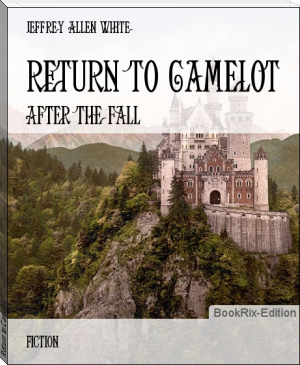A Connecticut Yankee in King Arthur's Court by Mark Twain (any book recommendations TXT) 📗

- Author: Mark Twain
Book online «A Connecticut Yankee in King Arthur's Court by Mark Twain (any book recommendations TXT) 📗». Author Mark Twain
THE SMALLPOX HUT
When we arrived at that hut at mid-afternoon, we saw no signs of life about it. The field near by had been denuded of its crop some time before, and had a skinned look, so exhaustively had it been harvested and gleaned. Fences, sheds, everything had a ruined look, and were eloquent of poverty. No animal was around anywhere, no living thing in sight. The stillness was awful, it was like the stillness of death. The cabin was a one-story one, whose thatch was black with age, and ragged from lack of repair.
The door stood a trifle ajar. We approached it stealthily—on tiptoe and at half-breath—for that is the way one’s feeling makes him do, at such a time. The king knocked. We waited. No answer. Knocked again. No answer. I pushed the door softly open and looked in. I made out some dim forms, and a woman started up from the ground and stared at me, as one does who is wakened from sleep. Presently she found her voice:
“Have mercy!” she pleaded. "All is taken, nothing is left.”
“I have not come to take anything, poor woman.”
“You are not a priest?”
“No.”
“Nor come not from the lord of the manor?”
“No, I am a stranger.”
“Oh, then, for the fear of God, who visits with misery and death such as be harmless, tarry not here, but fly! This place is under his curse—and his Church’s.”
“Let me come in and help you—you are sick and in trouble.”
I was better used to the dim light now. I could see her hollow eyes fixed upon me. I could see how emaciated she was.
“I tell you the place is under the Church’s ban. Save yourself—and go, before some straggler see thee here, and report it.”
“Give yourself no trouble about me; I don’t care anything for the Church’s curse. Let me help you.”
“Now all good spirits—if there be any such—bless thee for that word. Would God I had a sup of water!—but hold, hold, forget I said it, and fly; for there is that here that even he that feareth not the Church must fear: this disease whereof we die. Leave us, thou brave, good stranger, and take with thee such whole and sincere blessing as them that be accursed can give.”
But before this I had picked up a wooden bowl and was rushing past the king on my way to the brook. It was ten yards away. When I got back and entered, the king was within, and was opening the shutter that closed the window-hole, to let in air and light. The place was full of a foul stench. I put the bowl to the woman’s lips, and as she gripped it with her eager talons the shutter came open and a strong light flooded her face. Smallpox!
I sprang to the king, and said in his ear:
“Out of the door on the instant, sire! the woman is dying of that disease that wasted the skirts of Camelot two years ago.”
He did not budge.
“Of a truth I shall remain—and likewise help.”
I whispered again:
“King, it must not be. You must go.”
“Ye mean well, and ye speak not unwisely. But it were shame that a king should know fear, and shame that belted knight should withhold his hand where be such as need succor. Peace, I will not go. It is you who must go. The Church’s ban is not upon me, but it forbiddeth you to be here, and she will deal with you with a heavy hand an word come to her of your trespass.”
It was a desperate place for him to be in, and might cost him his life, but it was no use to argue with him. If he considered his knightly honor at stake here, that was the end of argument; he would stay, and nothing could prevent it; I was aware of that. And so I dropped the subject. The woman spoke:
“Fair sir, of your kindness will ye climb the ladder there, and bring me news of what ye find? Be not afraid to report, for times can come when even a mother’s heart is past breaking—being already broke.”
“Abide,” said the king, “and give the woman to eat. I will go.” And he put down the knapsack.
I turned to start, but the king had already started. He halted, and looked down upon a man who lay in a dim light, and had not noticed us thus far, or spoken.
“Is it your husband?” the king asked.
“Yes.”
“Is he asleep?”
“God be thanked for that one charity, yes—these three hours. Where shall I pay to the full, my gratitude! for my heart is bursting with it for that sleep he sleepeth now.”
I said:
“We will be careful. We will not wake him.”
“Ah, no, that ye will not, for he is dead.”
“Dead?”
“Yes, what triumph it is to know it! None can harm him, none insult him more. He is in heaven now, and happy; or if not there, he bides in hell and is content; for in that place he will find neither abbot nor yet bishop. We were boy and girl together; we were man and wife these five and twenty years, and never separated till this day. Think how long that is to love and suffer together. This morning was he out of his mind, and in his fancy we were boy and girl again and wandering in the happy fields; and so in that innocent glad converse wandered he far and farther, still lightly gossiping, and entered into those other fields





Comments (0)